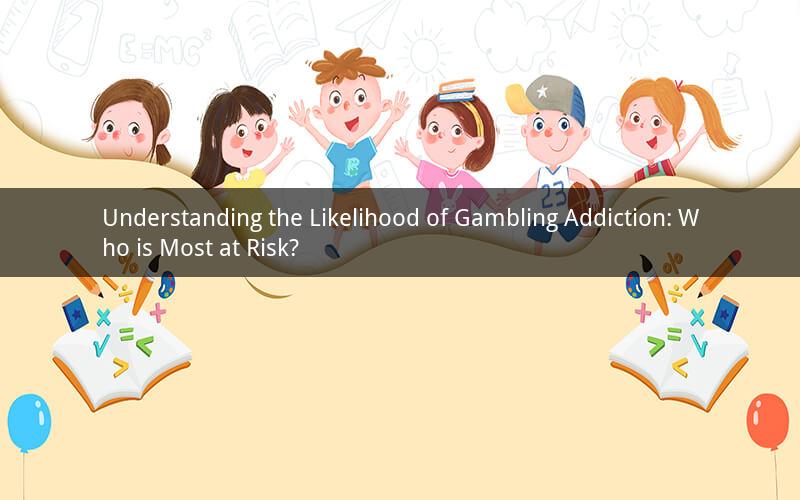
Introduction:
Gambling addiction, also known as problem gambling, is a growing concern in society. It affects individuals from all walks of life, but certain groups may be more susceptible to developing an addiction. In this article, we will explore the factors that contribute to the likelihood of becoming addicted to gambling and identify the individuals who are most at risk.
1. Genetic Factors:
Research suggests that genetics play a significant role in the development of gambling addiction. Individuals with a family history of addiction, particularly to substances or other behavioral addictions, are more likely to develop a gambling addiction themselves. The presence of certain genetic markers can increase the risk, making it crucial for individuals with a family history to be cautious and seek support if they engage in gambling activities.
2. Psychological Factors:
Psychological factors also contribute to the likelihood of developing a gambling addiction. People who struggle with anxiety, depression, or other mental health issues may turn to gambling as a form of self-medication or an escape from reality. The thrill and excitement associated with gambling can provide temporary relief, leading to a cycle of dependency. It is essential for individuals experiencing mental health challenges to seek appropriate treatment and support.
3. Environmental Factors:
The environment in which an individual lives can significantly impact their likelihood of developing a gambling addiction. Access to casinos, online gambling platforms, and gambling advertisements can create a temptation that is hard to resist. Additionally, individuals who grow up in families where gambling is seen as a normal and acceptable activity may be more inclined to engage in it themselves. Creating a supportive and informed environment can help mitigate the risk of developing a gambling addiction.
4. Social Factors:
Social influences can also contribute to the likelihood of becoming addicted to gambling. Peer pressure, the desire to fit in with a certain group, or the influence of role models who engage in gambling can all play a role. Individuals who feel a sense of belonging and connection to a gambling-oriented community may be more likely to develop an addiction. Encouraging healthy social interactions and fostering a supportive community can help reduce the risk of gambling addiction.
5. Demographic Factors:
Certain demographic factors can increase the likelihood of developing a gambling addiction. For example, individuals in their late teens and early twenties are more susceptible to gambling addiction due to their risk-taking behaviors and exposure to gambling opportunities. Additionally, individuals from lower socioeconomic backgrounds may be more vulnerable due to financial stress and the desire to improve their economic situation. Understanding these demographic factors can help identify individuals who may require additional support and intervention.
Conclusion:
Who is most likely to become addicted to gambling? The answer is multifaceted, encompassing a combination of genetic, psychological, environmental, social, and demographic factors. By understanding these factors, individuals, families, and communities can take proactive steps to prevent and address gambling addiction. It is crucial to seek support and treatment if gambling becomes a problem, as early intervention can make a significant difference in an individual's recovery journey.
Questions and Answers:
1. Q: Can someone develop a gambling addiction without any family history of addiction?
A: Yes, it is possible for individuals to develop a gambling addiction even without a family history of addiction. Other factors such as psychological vulnerabilities, environmental influences, and social pressures can contribute to the likelihood of developing an addiction.
2. Q: Can gambling addiction be cured?
A: Gambling addiction is a complex condition that requires ongoing management and support. While there is no one-size-fits-all cure, treatment programs and support groups can significantly improve an individual's chances of recovery. It is crucial for individuals to seek professional help and engage in long-term recovery efforts.
3. Q: Can online gambling be more addictive than traditional casino gambling?
A: Online gambling can be more addictive than traditional casino gambling due to the convenience, accessibility, and the potential for rapid financial loss. The immersive nature of online gambling platforms can make it easier for individuals to become engrossed in the activity, leading to increased risk of addiction.
4. Q: How can I help a loved one who is struggling with a gambling addiction?
A: It is important to approach your loved one with empathy and support. Encourage them to seek professional help, offer to accompany them to therapy sessions or support groups, and help them develop healthy coping mechanisms. It is also crucial to educate yourself about gambling addiction and the available resources for support.
5. Q: Can gambling addiction be prevented?
A: While it is challenging to completely prevent gambling addiction, there are steps that can be taken to reduce the risk. Educating individuals about the potential dangers of gambling, promoting responsible gambling practices, and creating supportive environments can help mitigate the likelihood of developing an addiction. Additionally, addressing underlying psychological and social factors can contribute to a healthier relationship with gambling.